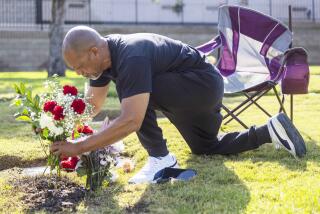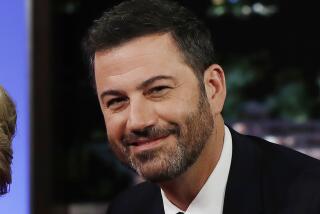One Family, Three Personifications of Survival
- Share via
The people who admire the Kuhnses family--and there are plenty of them--say it’s impossible to pick which of the three Kuhns they look up to most.
There is Justin, 17, born with cardiomyopathy but who came home Thursday with a new heart beating inside. There is dad Jerry, who was driving on the freeway one day when 20 tons of salad dressing toppled from a truck and crushed him, leaving all but his head and lower arms useless. There is mom Gina, who married at 22 and became a full-time caretaker four years later.
Yet under the weight of life-altering medical disasters the trio has managed valiant buoyancy. Faith and mirth, they say, have delivered them through the worst moments.
And those seemed behind them Thursday afternoon.
For the first time since last fall, the 41-year-old parents brought home their only child from Childrens Hospital Los Angeles to their Laguna Hills residence, where they were welcomed by their excited dachshund Scoobie, Pearl the screeching cockatoo and an assortment of friends and family.
“I’ve known Justin since the beginning of seventh grade,” said best friend Jason Helring, 17, of Mission Viejo, one of three pals who nearly every weekend since last October car-pooled to keep hospital-bound Justin company. “He’s always been a fighter, even with only 19% of his heart working. He wrestled guys twice his size in P.E., he played basketball, baseball, roller hockey. He was in marching band with the trumpet. . . . Justin wouldn’t stand for living in a bubble, even if his parents tried to make him. They wouldn’t, though. I mean, look at his dad.”
For two years after his boy’s birth in 1982, Jerry Kuhns had been praying to make a deal with God: my life for my heart-damaged toddler’s. So when he was trapped in the cab of his pickup in a freak 1984 Artesia Freeway crash, the 26-year-old father thought this was it--finally the cosmic trade come true.
Instead, he survived as a near-quadriplegic. By all accounts, he is a model for making the most of what you have. “Use it or lose it,” wife Gina says almost matter-of-factly.
With slight strength in his palms and some biceps but no triceps power, Jerry wears metal braced gloves to push his wheelchair through the Mission Viejo Mall near his house, usually navigating more than a mile per visit. His wife and son window-shop, and every hour someone--quite often Justin and his friends, or one of Jerry’s nurses--has to move the dead weight that is his body in order to prevent sores.
There are others impressed by Jerry Kuhns’ determination to squeeze the most out of every day, his wife helping to pull it off and the example they have passed on to their son.
Even after Justin’s heart capacity dropped to below 20%, Justin had been playing three sports and trombone in the marching band. He’d gone fishing with his grandfather. And after one month on the job he became the youngest supervisor at an Aliso Viejo movie theater.
Justin and others credit his resilient parents.
“Jerry had to learn the hard way: You either quit or go on. And he decided to go on. I think it’s admirable,” observed mall security supervisor Bob Rahner, 61. “He does the upper level and lower level here; it’s right close to a mile or more.”
When the weeks turned into months of waiting for a new heart, Rahner wanted to help. “Jerry, he is very deserving of getting a good break for a change.”
Though it’s precious little solace, the family did get a break of sorts after Jerry’s accident.
Jerry’s recovery had taken months and months. His wife could not work. A threadbare five years followed. Then a Norwalk jury awarded Jerry and Gina Kuhns $15.2 million in damages, a bill split between Caltrans and the truck driver. Jurors found that Caltrans chose not to spend $3,000 to repair what it knew was a problem on the sharply curving transition: a horizontal concrete abutment that split the truck’s side open like a sardine can, the contents “exploding” out and over the bridge.
Forty thousand pounds of Miracle Whip raining down on him. Not exactly the fate he expected.
The money is what has and will support them for life.
“I’d give back every cent of it in a heartbeat to have him be OK,” Gina Kuhns said. “After his accident, then our son, you just do what comes to you. That’s what I was put here for. To care for them.”
Long, Rough Road Back Home for Teen
Justin has had a rough road home.
The waiting was the hardest part. It began last summer, when a test showed that his heart was functioning at far below capacity. As most children with cardiomyopathy require transplants by the age of 10, Justin had been living on borrowed time. His doctor got him on a waiting list for a compatible heart, meaning one belonging to a mortally wounded person near his size and, ideally, his age.
Nevertheless, Justin started Laguna Hills High in September, had to give up the rigorous marching band, and wore a pager everywhere should a heart become available. Twice the pager went off at school, both times wrong numbers.
When he developed problems that included an irregular heartbeat the next month, his doctor tested him and admitted him to the hospital the same day. And more waiting ensued.
In the months that followed, Justin’s chest was opened up three times--twice in one day--in efforts to keep him alive for the wait. He had a mechanical device installed that assists the heart in pumping. When a tube came off the device, Justin nearly died before an operation fixed it.
Finally, a fourth surgery gave him a compatible donor heart on, fittingly, Valentine’s Day. It had belonged to a teenager who suffered fatal head injuries. Four nights later, as his family celebrated his 17th birthday, a young man Justin came to know in the room next door, only 18, died awaiting heart and lung transplants.
Because Justin has grown up with a family that takes nothing for granted, he has a perspective that belies his age, as well as a group of admirers who came to know him over five months at the hospital.
“One week after the transplant he was wanting a date for when he’d get out of here,” Dr. Jacqueline Szmuszkovicz said with amusement. “He was making plans for school. . . . He was making a list of the sports he needed to get back to, like snowboarding and baseball. So he’s incredibly motivated, and his family and extended family has been there for months by his side.”
And they were there Thursday at dusk, when Justin was greeted home by his aunt Vicky, his dad’s nurse William Stine, and best buddy Jason, who looks forward to resuming their pastimes, from Mighty Duck hockey games to Wednesday night Bible studies. They have prayed for him daily, as have their parents and even Jason’s 84-year-old grandmother.
The boyhood friends have a plot well underway for a two-week cross-country camping trip this summer. The plan: to drive and drive until they hit the Atlantic Ocean, then turn around and come back.
Justin is grateful for the new heart thumping inside of him. It is so robust compared to his own that it sometimes unnerves him.
While mostly sporting a brace-filled and an optimistic smile, Jason lets his sense of loss emerge from time to time, in a manner at once comical and touching.
It seems, for instance, that Justin wanted his old heart preserved, as a keepsake. Specifically, he wanted it mounted. Like a marlin.
But Doctor Jackie had blanched; she told his parents it was kind of ugly and wouldn’t make for pleasing art. This quote was passed on via his parents. Justin’s eyes went to half squint and his mouth twisted into a wince--the incredulous-bordering-on-disgusted expression teenagers specialize in. Then he could only stare.
“Did she at least take a picture?” he said finally, and his parents knew their son with the oversized heart was going to be fine.
A Wife and Mother Bears Great Burdens
A few days after Justin’s life-changing transplant, Jerry and Gina Kuhns sat in their living room, uncluttered by furniture for wheelchair convenience. He teared up in a rare display of sadness; the usually composed couple grew emotional when the subject became nostalgic: life before the crash, before they knew their son had a heart that wouldn’t last.
He, a chain-link fence maker from Victorville, she, a student from South Gate. They both were 19 when they met in 1977 at a Santa Ana dance. They were 22 when they married and settled in Downey. They were 24 when Justin was born. They were 26 at the time of the crash.
“We would have had more children,” Gina said, her voice trailing off.
“Going through all the trauma,” Jerry said with a sigh. He can do very little for himself, yet those who love him say he musters an inspiring level of dignity. Neither he nor his wife would ever suggest this life of theirs has been easy.
Gina shows perhaps the least sign of strain, yet her sister thinks she worries the most.
“It takes a lot to shake her,” sister Vicky Nunley, a Whittier real estate agent, said late Thursday as she hung welcome home signs while awaiting the Kuhns caravan.
She’d brought a cake and fried chicken dinner, and an early Easter basket filled with candy and religious candles. She had e-mailed a prayer request on the Internet and pleas for people to not forget the urgent need for organ donors, prompting a flood of responses.
Her big sister is outwardly calm, Nunley observed, “but I think she is a bit scared. Now that Justin is home, it’s up to her again.”
By nightfall, guests sported yellow surgical masks as a precaution against infection for Justin. A technician delivered oxygen equipment that will help Justin breath overnight.
And their teenager, hands still quaking some, surveyed the food supply. “Wow,” he said, “I’ve never seen our refrigerator so empty.”
For her part, Gina thinks that her ability to cope has been influenced by the strength of her own mother. A single parent bringing up three kids in South Gate, Gina’s mom could not afford a car; she got her kids everywhere by the public bus system. Doing without but making do, Gina said, taught her patience that sees her through now.
“I have my bad days. I cry. I pray. But what else are you going to do? You just do it,” Gina says softly. “You go on living.”


